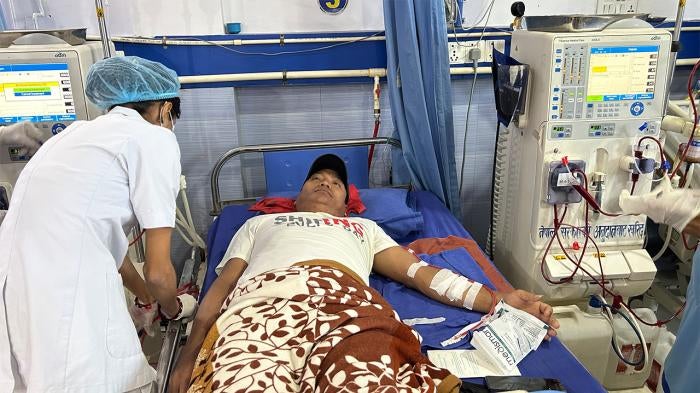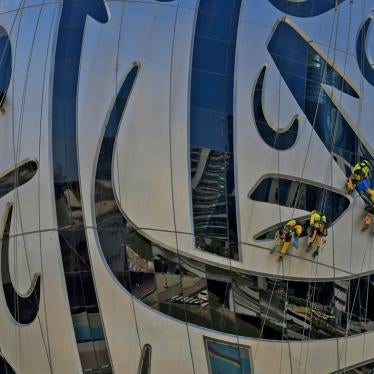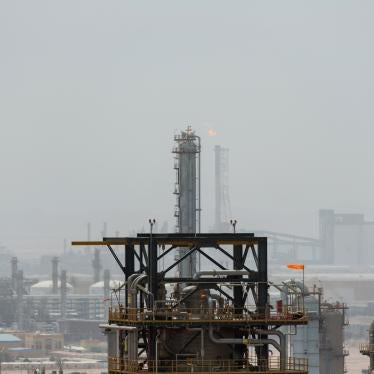- Migrant workers form 88 percent of the UAE population and often come from climate-vulnerable countries. UAE-based workers are exposed to escalating climate risks, especially extreme heat, which is linked to chronic health harms and even death.
- Widespread labor abuses like exorbitant recruitment fees and wage theft limit workers’ ability to send financial support back home, including during climate-linked extreme weather events.
- These abuses in the UAE, which is hosting the upcoming COP28 climate conference, contribute to climate injustice in multiple ways.
- Governments attending the conference should press the UAE for labor reforms and states should offer support to climate-vulnerable communities in countries like Nepal, Bangladesh, and Pakistan.
(Beirut) – Migrant workers in the United Arab Emirates are exposed to escalating climate risks, especially working in extreme heat without adequate protections, which can cause chronic harms to their health, Human Rights Watch said today. Additionally, migrant workers face other widespread labor abuses like wage theft and exorbitant recruitment fees that have restricted their abilities to support their families back home, including during extreme weather events often linked to climate change. These abuses are occurring in a context where the UAE and other historic emitters are fueling the climate crisis. The UAE is one of the world’s largest oil producers and among the highest per capita emitters of greenhouse gases.
Governments should pressure the UAE, the host of the upcoming annual United Nations Climate Change Conference (COP28), to strengthen its labor protections for migrant workers, who constitute over 88 percent of the country’s population, to address these abuses. Governments most responsible for climate change, like the UAE, as well as major private oil companies, should offer support, including climate financing, to communities in climate-vulnerable countries like Nepal, Bangladesh, and Pakistan that have been hardest hit by climate change. All states and companies should phase out fossil fuels that are driving the climate crisis.
“UAE-based migrant workers and their communities back home are among those contributing least to the climate crisis, yet are often the ones who have the greatest exposure to climate harms and are struggling to deal with them,” said Michael Page, deputy Middle East director at Human Rights Watch. “Not only is the UAE contributing to the climate crisis as one of the world’s largest fossil fuel producers, but its deep-rooted labor abuses and inadequate heat protections contribute to climate injustice in multiple ways.”
Human Rights Watch interviewed 73 current and former UAE-based workers and 42 families of current migrant workers between May and September 2023 from Pakistan[i], Bangladesh[ii], and Nepal[iii]. Ninety-four interviewees live in or are from areas already facing the devastating consequences of the climate crisis, with scientific studies linking extreme weather events like floods, cyclones, and salinization of agricultural lands to climate change. In addition, former and current outdoor workers interviewed were working in jobs like construction, cleaning, agriculture, animal herding, and security, and were often exposed to the UAE’s extreme heat, which is also increasing due to climate change.
Extreme heat is a serious health hazard. It can be fatal or have lifelong consequences. Heat can exacerbate pre-existing conditions, impair cognitive function, and increase the risk of workplace injuries. It can also cause heat rash, cramps, heat exhaustion, and heat stroke. Yet, the UAE has failed to protect workers from these dangers and continues to rely on arbitrary, pre-defined midday work bans in summer months instead of more effective risk-based standards, such as the Wet Bulb Globe Temperature (WBGT) index, and applying evidence-based guidelines that impose work stoppages when conditions become dangerous.
“I have fainted multiple times due to the heat,” said a security guard who works outdoors. “I sweat profusely, and my face gets completely burnt. The supervisor's watchful eyes scare us. I had [recruitment] loans to repay, I could not afford to get terminated. So, I pushed myself.”
UAE-based migrant workers are indispensable in advancing the UAE’s adaptation efforts to the country’s increasing extreme heat. A Pakistani air conditioning (AC) technician now in Pakistan said: “The excessive heat [in UAE] makes living without air conditioning impossible. Repairing units is akin to an emergency. Clients demand swift repairs.” He said he worked 14-hour days in the heat without health insurance, had no paid sick leave, and faced additional salary deductions for the days he was too sick to work.
The UAE authorities are externalizing climate risks to migrant workers, who are disproportionately exposed to extreme heat, without ensuring adequate protections and by sending workers home who face serious health harms without remedy, Human Rights Watch said.
Many studies have shown higher incidence of kidney injuries in outdoor workers exposed to hot environments, including among migrant worker returnees, which can be devastating for migrant workers and their families. A Nepali dialysis patient who returned from the UAE with end-stage renal failure said, “If the Nepal government hadn’t offered free dialysis, patients like us without money wouldn’t survive.” The remaining costs associated with treatment can be substantial.
Beyond inadequate heat protections, migrant workers are also subject to serious labor abuses like wage theft and exorbitant recruitment fees which affect their ability to send home remittances. At the heart of enabling such abuses lies the inherently abusive sponsorship, or kafala system, that ties their visas to their employers and makes them highly vulnerable, including restricting job mobility and confiscating passports. The UAE also bans trade unions, which inhibits workers’ ability to demand stronger labor protections.
Human Rights Watch research and academic studies have demonstrated that remittances have long been a critical income source for migrant workers’ families. For instance, Bangladesh and Pakistan are among the top 10 recipients globally of remittances. Remittances take on particular significance during emergencies and economic downturns, including during climate-related extreme weather events. They can help reduce migrant workers’ families’ vulnerability to economic shocks and meet basic needs like food. Remittances, however, are not a panacea nor a substitute for states’ responsibilities, as well as for historical and major greenhouse gas emitters, to support communities heavily impacted by the climate crisis.
Because many workers fall victim to common abuses like exorbitant recruitment fees, contract violations, fraudulent visas, and wage theft, they are further limited in sending home critical remittance payments.
The father of a UAE-based migrant worker was displaced by the 2022 Pakistan floods linked to climate change in a World Weather Attribution study. He told Human Rights Watch that because of his son’s recruitment fee debts, his son was unable to send remittances. “Had [my son] been able to send us some money, it would have eased our burden by enabling us to arrange for food, shelter…” He added, “Realistically, we don’t expect support from him; our primary hope is that he will [at least] repay his recruitment debt.”
Interviewees across climate vulnerable communities described how extreme weather and slow onset events led to massive economic and social costs, including homes being destroyed, livestock killed, agricultural land ruined, and an extensive loss of livelihoods. These impacts are only expected to increase. The Intergovernmental Panel on Climate Change (IPCC) has concluded that South Asia's hotter climate is increasing the frequency, intensity, and duration of heatwaves, extreme precipitation, and various forms of water scarcity, among other climate risks despite these countries’ negligible contribution to global greenhouse gas emissions: Bangladesh 0.48 percent, Pakistan 0.98 percent, and Nepal 0.10 percent.
“Remittances are not a cure-all for challenges migrant workers’ families face, nor should it be considered a replacement for proper climate adaptation planning,” Page said. “However, remittance earnings remain a crucial financial source, and exorbitant recruitment fees and wage theft deny UAE-based migrant workers their rightfully owed dues, including during life-threatening climate emergencies.”
Background on South Asian Labor Migration to the UAE
Labor migration has been a longstanding livelihood strategy for countries like Bangladesh, Pakistan, and Nepal as people seek out better earning opportunities. Remittances are critical for families back home to meet vital expenses like food, health, and education. Remittances are equivalent to a quarter of Nepal’s GDP, while Pakistan and Bangladesh are among the top 10 remittance recipients globally.
According to government statistics from Bangladesh, Pakistan, and Nepal, in 2022, for example, over 100,000 Bangladeshis, 122,000 Nepalis, and 128,000 Pakistanis traveled for employment to the UAE alone. The roots of UAE’s mass recruitment of migrant workers are linked to the explosion of national wealth derived from the fossil fuel industry that has enabled UAE’s rapid and ambitious transformation over the last few decades.
Poverty, demographics, and political instability are all factors that drive migration. As noted by the IPCC, migration and displacement linked to climate change have largely occurred within countries and across borders to neighboring countries. Climate change is also compounding drivers of migration along established routes, such as from South Asia to the Gulf, even though isolating the impact of climate change from other migration drivers is challenging.
Human Rights Watch focused its research on climate-vulnerable communities that also have a history of labor migration to Gulf countries like the UAE.
Lack of Adequate Protection to Extreme Heat
The UAE, despite contributing to the climate crisis, itself faces serious climate risks, including extreme heat. The IPCC has said that Gulf states’ “extreme WBGT (wet-bulb global temperature) are expected to approach, and possibly exceed, the physiological threshold for human adaptability (35 degrees Celsius or around 95 degrees Fahrenheit) by the end of the century.” Multiple studies and projections have indicated that extreme heat risks have escalated in the UAE in recent years due to climate change.
Migrant workers are disproportionately affected by the increasing extreme heat risks. While the UAE's Climate Risk Assessment recognizes that outdoor workers are among the most vulnerable to heat-related illnesses, including mortality risks, they continue to rely solely on an ineffective summer midday work ban as the primary heat protection measure despite robust evidence of its inadequacies. A study in Kuwait found a substantial increase in the risk of occupational injuries associated with extremely hot temperatures, despite the ban. Another study found that the highest heat intensity for workers in Saudi Arabia was from 9 a.m. to noon, while the ban is in effect between noon and 3 p.m.
Workers said it is part of their routine to pour sweat out of their shoes and wring out perspiration from their clothes multiple times a day. A UAE-worker said, “[Even] excluding these three hours… the air is as hot as fire.” A security guard said, “Even after 3 p.m., it remains intolerably hot. We have no choice but to work. Our clothes itself become so hot they burn.”
Outdoor workers reported nosebleeds, dizziness, vomiting, and fainting from the heat. A rope-access cleaner said, “When we feel dizzy in the scorching heat, we request our colleagues to lower us.” Another construction worker said, “When it gets too hot, my hands stop functioning properly as my muscles tighten up and get too stiff.”
A Pakistani worker told Human Rights Watch, “If we take a day off, the company deducts three days' salary … If we say something or disagree … the foreman threatens to cancel our visas and arrange for our deportation.”
In addition to banning trade unions, the government’s opacity around health data hampers research for evidence-based policymaking, and academics and journalists tend to self-censor to avoid reprisals. There is no federal legislation mandating employers to provide health insurance for employees, while only Dubai and Abu Dhabi have mandatory health insurance laws.
The UAE's extreme heat harms migrant workers' health, but with inadequate social protection or remedy for affected populations who return home without support including with long-term illnesses like end-stage renal failure, the care burden shifts to overstretched healthcare systems of migrant origin countries.
Additional Harms of Widespread Wage Theft, Exorbitant Recruitment Fees
In the context of climate change, the role of remittances can take on even more significance by allowing families to diversify income sources and have continued access to food and other essentials. But workers' abilities to send these remittances are often restricted by widespread wage abuses and exorbitant recruitment fees they face in the UAE.
Migrant workers and their families said remittances are used primarily for food expenses, children’s education, and loan repayment. Families of migrant workers who were impacted by extreme weather events said that after these incidents they needed funds to rebuild homes, repay loans, and restore livelihoods.
Only six migrant workers said they were able to send extra financial support during climate-related crises like floods, usually just a one-time additional remittance payment. Workers were only able to do this by borrowing, cutting living costs, or working overtime. When workers borrowed from UAE-based networks, it adversely impacted future remittances they sent home. As one father who received PKR200,000 (US$705) from his son after floods devastated their home said, “He is still in the process of repaying the loan [he took to send an additional remittance payment] and hasn't been able to send us any further financial support.” Meanwhile, in Pakistan, his family also has to repay the loans from their son’s recruitment fee, which cost PKR 700,000 ($2,452). He added, “The lenders are pressuring us relentlessly to repay the debts.”
All but one interviewee paid exorbitant recruitment fees that they primarily finance via loans borrowed at predatory annual interest rates as high as 50 percent or by selling assets like livestock. Workers consequently dedicate a large percentage of their salary just to repay the debt, which can take months or even years.
This debt trap triggers a series of vulnerabilities throughout a migrant worker’s journey while undermining the benefits of migration. Back home, families saddled with debt also struggle financially and are under constant pressure from money lenders.
A Bangladeshi returnee aptly describes debt-trap-induced vulnerabilities:
“… many Bangladeshis cannot return even when they face troubles in the UAE or are not paid for their hard work. Why? Because they sold everything to go to the UAE.”
Recruitment fees are also high for workers on azad (free) visas, an arrangement in which companies or individuals sell their visa allocations to workers for profit. This is an illegal practice, but workers are drawn to the freedom of not being tied to a single employer though they often pay even higher punitive recruitment fees.
The father of a UAE-based migrant worker on an azad visa for seven months said his son has only sent PKR 20,000 ($70) given high living expenses and struggles finding work in Dubai. Reeling from the floods, he said, “Our only ray of hope lies in my son … He often reassures me, saying, “Father, I have faith that one day I will find work and support you.” It is this hope that sustains us through these difficult times.”
Recruitment fees, while illegal, are a ubiquitous aspect of Gulf recruiting practices, and the UAE has failed to effectively limit such practices. Previous Human Rights Watch research has demonstrated that while recruiters often operate in countries of origin, hiring companies in destination countries like the UAE also drive up recruitment fees.
Employers can refuse to cover all, or part, of the costs related to the recruitment or take commissions in exchange for job orders which the recruiter passes down to the worker. In other instances, employers may cover all costs, but their lack of oversight and due diligence means unethical recruiters can charge both the employer and the worker.
Respondents said their ability to repay outstanding recruitment debt is further diminished during extreme weather events that destroy their livelihoods while increasing expenses like food or temporary shelter. The exorbitant interest payments keep piling on, burying them deeper into debt and in many cases, risk losing their property like land, houses, or jewelry they pledge to obtain the loans.
A Pakistani father of a UAE-based migrant worker said that “… Up until now [a year later], he [my son] hasn’t sent a single penny to us. The lender continues to demand their money… [but] we have lost everything in the flood. As soon as we receive funds from him [my son], we will promptly repay the loan.”
Yet even payment of exorbitant recruitment fees in no way guarantees migrant workers safe and stable employment that meets contractual promises. The uncertainty and risk of emigration outcomes is reflected in the case of a victim of the devastating 2021 Melamchi flood from Nepal who said that, “During the flood, all we wanted was to save our lives. We survived, but we lost everything. The flood finished us.”
His wife is headed to the UAE for a waitressing job which cost her NPR 200,000 ($1,495), borrowed at 24 percent annual interest rate. He said, “Her first year’s salary [$262 per month] will go just to repay the loans if all goes well. That is the best-case scenario. But will she be paid? It’s her luck, her fate.”
While no evidence specifically attributes the Melamchi flood to the climate crisis, the IPCC has projected an increase in daily precipitation in much of the South Asian region and that further climate-linked rises in temperatures increase the risk of extreme flooding, especially during monsoon.
A Bangladeshi father of one former and two current UAE-based workers said that neither fishing, nor agriculture where he lives in Sathkira remains profitable. Costly overseas work has not paid off either, as only one of his three sons has been able to send remittances during emergencies, albeit just BDT 5,000-10,000 ($45-$90) monthly.
A Saudi returnee himself, the father said, “We are from a poor country and just like my generation, my sons are also getting exploited … I witnessed many disasters in my life…[cyclones] Sidre, Aila, Bulbul, Amphan … These disasters are happening at a greater scale, which make us poorer and poorer.”
One of his sons described the situation in the UAE that had constrained his ability to send home financial support. He was paid AED 750 (U$204), despite being promised AED 1200 ($327). But the company stopped paying even that amount after a few months. He told Human Rights Watch, “When the company was not paying our salaries on time, they provided a food allowance [AED 200-300 ($54-$82)] instead. They stated that since they were covering our food expenses, workers should not raise any objections.” He described his accommodation as a “container” and had to spend four hours just to commute for work every day.
He said he was not able to change jobs and was too scared to run away to work irregularly like many of his colleagues had. He added, “I wish I could go to a country which has some basic [living] facilities, respects workers, and pays their salary on time.”
As per the IPCC, climatic disruptions such as cyclones and storms in South Asia also force saline water into coastal agricultural lands, causing long-lasting crop-damage, and that in a region in Sathkira, salinity-free farmland has been reduced to nil over the last two decades.
Climate emergencies exacerbate the mental stress of wage theft and recruitment debts as families back home are in increasingly dire and even life-threatening situations. Workers unable to send remittances because of labor abuses said the dilemma they face is that their families lose both critical financial support and the help they could have provided for urgent tasks like rebuilding damaged property had they stayed home.
A Pakistani construction worker who was promised AED 1,700 ($460) but paid AED 1,200 ($320) despite paying exorbitant recruitment fees said the 2022 floods destroyed his house and livestock: “My family was displaced to the roadside, where they camped out under the open sky for over 2.5 months.” He decided to return to help them, “[After the floods] I tried to return to Pakistan, but the employer said I could not since I had a two-year contract.” To retrieve his passport, he paid AED 1,000 ($272).
Another Pakistani returned prematurely after the 2022 floods despite paying PKR 250,000 ($900) for the job, selling livestock and borrowing informally. He said, “I was in Dubai for eight months, earning only AED 700 [$190] when I was promised AED 1,100 [$300]. I returned after the floods as my earnings could not sustain my family....”
A Bangladeshi migrant worker returned home in 2023 after being 18 months into his two-year contract due to wage theft despite paying BDT 300,000 [$2,734] for the job. He told Human Rights Watch, “I thought there would be no progress even if I stay in the UAE for 20 years while my family will continue to struggle, so there was no option but to return … my luck did not support me. I could not send enough money [even] to pay for my recruitment loans.” He is still owed four months’ salary and is in a worse situation financially than before he migrated.
The UAE labor law mandates monthly payments through the Wage Protection System (WPS). If employers do not pay their employees, the law states non-compliance results in penalties, including work permit suspension, legal action, and fines. According to the US State Department's 2023 Trafficking in Persons report, the Human Resources and Emiratization Ministry handled 46,819 cases of unpaid wages during 2022. Yet, severe enforcement gaps persist.
A World Bank report has shown that high recruitment costs already pose a significant barrier for the poorest households to migrate. This reality of involuntary immobility is further exacerbated because of the climate crisis that, combined with a lack of financial resources or access to credit, can trap people, leaving them vulnerable to climate hazards and poverty, as noted by the IPCC.
Failure of UAE Reforms to Address Kafala System Abuses
The UAE has embarked on multiple waves of legal reform, but employers still hold disproportionate control over the workers. Workers struggle to change jobs although by law they can change jobs with the employer’s consent and need a “legitimate” reason to do so without it. Although it is illegal, employers routinely confiscate workers’ passports. Employers can file false absconding charges even when workers leave to escape abuse, causing their workers to risk detention and deportation. Even workers engaged in Expo City Dubai, where COP28 will be held, have faced widespread abuses like wage theft, illegal recruitment fees and passport confiscation despite additional protections under the UAE Expo 2020 Worker Welfare Policy.
Although the UAE’s labor law explicitly prohibits and criminalizes all forms of forced labor, rampant labor abuses including indebtedness, passport confiscation and job immobility leave migrant workers in highly vulnerable situations that in many cases even amount to forced labor.
A Nepali worker asked his father to send a false doctor’s note to say that his sick wife needed his care urgently so that he could retrieve his passport from his employer, who demanded AED 6,000 ($1,633) for it. “The work was physically very difficult,” he said. “My foreman used to hit me.” His employer reduced the fees to AED 2,000 ($544), which his father sent as “reverse remittances” from Nepal on loan.
A Pakistani construction worker opted to return after the 2022 floods that destroyed his home and belongings. He said, “During my time there, the company held onto my passport … I resorted to telling them a false story about my son’s death to retrieve it.” Referring to Dubai, he added, “Everything that glitters is not gold.”
Domestic workers, who are excluded from UAE’s labor law, along with shepherds, camel herders, and farm workers, are even more vulnerable to exploitation. They are often misled during job recruitment with false promises of different jobs, face wage theft abuses, and often work in isolated and sometimes inhumane conditions.
A Pakistani worker said to Human Rights Watch that he paid PKR 250,000 ($873) to take care of 70 goats and seven camels in the UAE desert with only one other colleague. His employer paid him only AED 800 ($217) per month and provided neither proper shelter and a bathroom nor a food allowance, leaving him with little to send home. In the heat, he had to ration his use of water, which the sponsor dropped off every seven to eight days.
His employer refused his appeal for a raise or financial support following the 2022 Pakistan floods that devastated his family. Instead, he was given an ultimatum to work for the same pay or leave. He left, despite outstanding recruitment debt, and said his mother told him: “Come back and we'll figure out how to survive here… eating once and going hungry the next is better than your stay abroad. Living apart doesn't solve our money trouble.”
Academic researchers have also examined other ways in which recruiters have exploited climate disasters as leverage while hiring workers. Professor Natasha Iskandar at New York University has highlighted the way that Qatari companies hired workers from climate-affected areas who had been newly impoverished at low wages. Human Rights Watch research also shows that migrant workers often tolerate contract violations and wage abuses because of debt bondage and limited livelihood options back home that are further hampered by climate impacts.
A Bangladeshi man from Sathkira said his salary has remained unchanged for six years, and his recruitment debt is still outstanding. Salinity intrusion back home has reduced vegetable and fruit yields. “I send BDT 15,000 to 17,000 [$135-226] every month,” he said. “I know this amount is very little... if I return to Bangladesh, the only option is to work in those fields. I Instead I do what I am doing in Dubai ... if I ask the company for a release paper [to change jobs], they will cancel my visa.”
A UAE-based migrant worker’s father from Monpura, Bhola, in Bangladesh, said it took 11 years for his son to earn BDT 30,000 ($273) a month, which was contractually supposed to be his starting salary. His son paid BDT 370,000 ($3370) in recruitment fees. He said Monpura is prone to cyclones, river erosion and declining crop yields. “I cannot ask my son to come back and rejoin me in agriculture,” he said.
Vulnerable Communities
Vulnerable communities’ experiences across South Asian countries offer a glimpse into a challenging future as the climate crisis imposes an increasing toll. Interviewees from Pakistan were affected by the devastating 2022 floods, from Bangladesh by cyclones, salinity intrusion, and river erosion, and from Nepal by floods, drought, and erratic rainfall. Governments in Bangladesh, Pakistan, and Nepal are yet to be adequately prepared for extreme weather events due to climate change.
“There is no greater suffering than witnessing your home and community under water,” said a Pakistani man from Khairpur devastated by the 2022 floods. “We had our own home in the village but here, we must pay rent, utilities, and other costs. We also lost two buffaloes and three goats… we used to sell their milk to supplement our income.”
A Bangladeshi man from Khulna affected by salinity intrusion said that “[Growing up], we did not have to buy any vegetables. After meeting our family's needs, we sold the rest. Now we cannot even fulfill our needs, selling in the market is out of question.”
“Our family is agriculture dependent,” said a UAE migrant from Sindhupalchowk, Nepal. “It rains when it shouldn’t, doesn’t rain when it should. At this time, the mountains would be fully snow-capped but we didn’t see much snow … We are subsistence farmers. Earlier we could sell crops … but now we have barely enough for ourselves.
“Whether climate change or not, we have to migrate to maintain a basic living standard … but things are changing. We were self-sufficient but now buy [food] items. Yields are lower. Insects and diseases are more common ...”
The sixth IPCC report has concluded that people in South Asia are at high risk of hunger, observed livelihood impacts including fisheries and livestock, and extreme poverty due to climate change. These are already realities for people Human Rights Watch interviewed.
Despite the devastation, interviewees said they received little to no longer-term support from their governments or other organizations. Some received emergency shelter in school buildings and cyclone shelters during floods and cyclones, and a few also reported receiving temporary support like emergency food, tents, or medical support. Climate impacts also erode informal support systems as interviewees said their friends and families were also affected.
“We are always harmed by disasters but hardly received any kind of government aid,” said a man from Khula, in Bangladesh. “We suffer, we struggle, we start building hope and that again gets shattered.”
Governments of countries that include major greenhouse gas emitters and producers should live up to their human rights obligations to address climate change, including by rapidly reducing greenhouse gas emissions, ensuring a just and equitable transition to renewable energy, and helping people adapt to the impact of the climate crisis.









